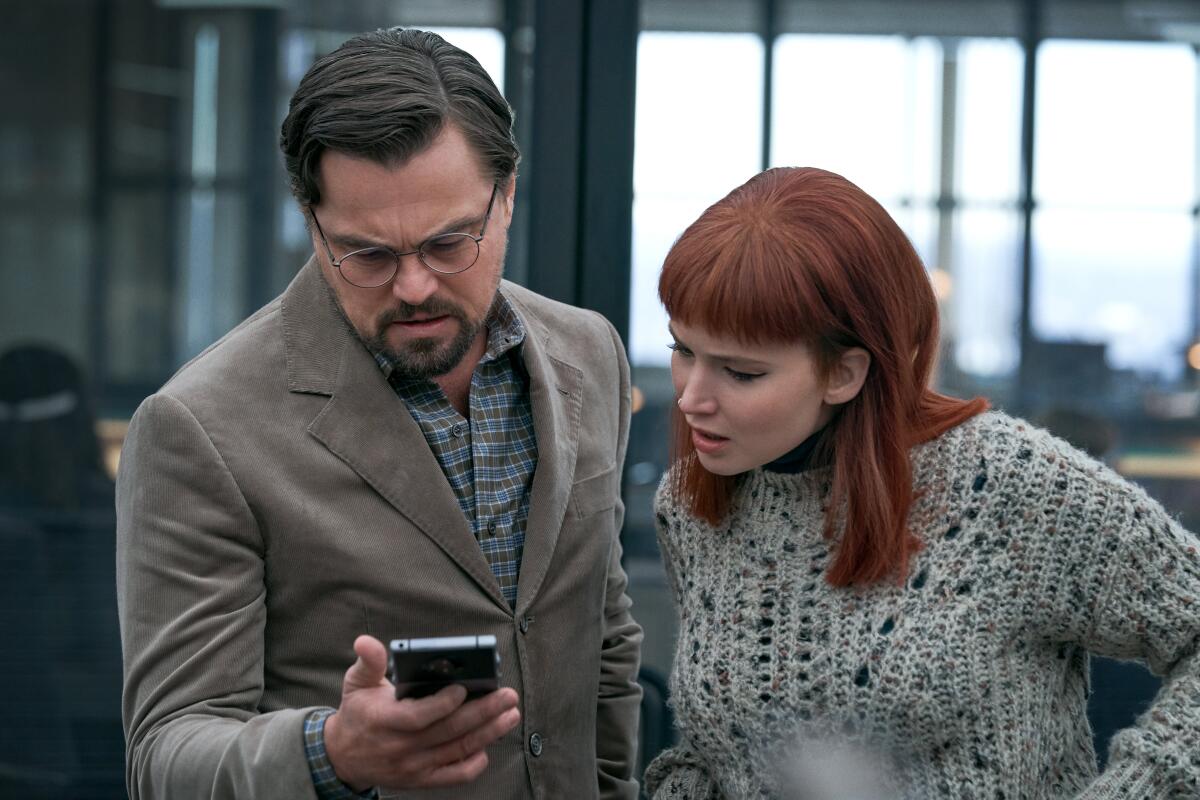Review: ‘Don’t Look Up,’ but there’s a scattershot satire headed your way on Netflix

The Times is committed to reviewing theatrical film releases during the COVID-19 pandemic. Because moviegoing carries risks during this time, we remind readers to follow health and safety guidelines as outlined by the Centers for Disease Control and Prevention and local health officials.
Late into the unwieldy end-of-days satire “Don’t Look Up,” writer-director Adam McKay briefly sets aside the easy snark and broad targets and reaches for a note of awe. He just about hits it. An enormous comet has appeared in the night sky, finally visible to the naked eye after having spent months making a beeline for Earth. It’s a terrifying sight but also a sublime one, a vision of inexorably approaching doom that — with an assist from a teary-eyed Leonardo DiCaprio and a gorgeously churning score by “Succession’s” Nicholas Britell — can’t help but stir a collective sense of wonder.
A moment like that stands in pointed opposition to the social malaise being diagnosed in “Don’t Look Up,” a semi-sweet, mostly sour comic dispatch from a world where wonder is for dummies and collective unity is a joke. A pre-apocalyptic satire about mass-media cynicism, political cronyism, Big Tech corruption, general American stupidity and anything else McKay and his co-writer, David Sirota, can squeeze into their crowded fish barrel, the movie is also its own high-concept genre collision, one that we might describe as Armageddon Iannucci. We are jolted along by an end-of-days blockbuster like “Deep Impact” (the art-house-inclined can throw in “Melancholia”) but also swept up in a behind-the-scenes realpolitik farce like “Dr. Strangelove” or “In the Loop.”
Those are daunting inspirations in service of a reasonably inspired premise. It begins with a Michigan State PhD candidate, Kate Dibiasky (Jennifer Lawrence), peering into the heavens and making a startling astronomical discovery. Comet Dibiasky, as it will be known, is speeding toward Earth and will make impact in a little more than six months; given that the comet is roughly 5 to 10 kilometers wide, it’s designated a “planet killer,” an extinction-level event waiting to happen. Dibiasky and her twitchy mentor, Dr. Randall Mindy (DiCaprio), report their findings to NASA and are promptly flown out to the White House, where their shock, pride and anxiety at being the bearers of such bad news are swiftly derailed by their utter disbelief at the corruption and incompetence that await them.
McKay and Sirota, a journalist and former advisor/speechwriter for the 2020 Bernie Sanders campaign, serve up a smorgasbord of satirical jabs plucked from the political detritus of the past four years and beyond: Oval Office nepotism, grossly unqualified Supreme Court picks, midterm election anxieties, war-room photo ops, sex scandals. The president, Janie Orlean (Meryl Streep), is a hack and a buffoon surrounded by many, none more poisonous than her high-ranking son, Jason (Jonah Hill in relentless insult-comic mode). She wastes no time minimalizing, trivializing and even flat-out ignoring the scientists’ findings, dismissing them as the latest of many exaggerated doomsday proclamations to cross her desk.

These scenes would be funnier if they were more incisively written (or at least more cleverly improvised), and also if the movie seemed to be actively critiquing rather than merely embodying the laziness of its targets. (Streep, who played a sharper politician in “The Manchurian Candidate” and a nicer Orlean in “Adaptation,” is here reduced to smirking reaction shots in a rare witless turn.) They also would be funnier if there weren’t a surfeit of depressing real-world evidence to back up the movie’s depressing conclusions.
What if the world were ending and no one gave a damn, including most of the people in a position to actually do something about it? That’s been more or less the decades-long story of climate change, which provided the original impetus for McKay’s satire (and surely helped secure DiCaprio’s interest). But that allegorical dimension has since been temporarily eclipsed by the COVID-19 pandemic, whose rampant misinformation campaigns have caused hundreds of thousands of pointless, preventable human deaths.
The comet’s death toll of course looks to be in the billions, which spurs Dibiasky and Mindy to disregard the president’s confidentiality orders and take their story public. But the news and entertainment media, much like the government they ostensibly exist to cover and critique, turn out to be no more interested in the substance of what the scientists have to say. A well-matched Cate Blanchett and Tyler Perry play a couple of morning talk-show chuckleheads who turn our heroes into inadvertent celebrities, though markedly different ones. While Mindy’s charming awkwardness quickly makes him America’s sexiest scientist (on par with a younger Dr. Fauci), Dibiasky’s expletive-laced on-air meltdown makes her a figure of instant ridicule — the butt of a joke shared by millions of merry consumers who prefer to meme and hashtag while Rome burns.
There’s an obvious strain of sexism in how Mindy and Dibiasky are received, and “Don’t Look Up,” again, has a way of subtly reinforcing what it’s ostensibly calling out. Both lead actors have dowdied themselves up to play a couple of Midwestern nerds: DiCaprio with plaid shirts and a thick beard, Lawrence with an auburn dye job and nose piercings. But there’s something telling (and selectively star-flattering) about the way Mindy is written as an Insta-thirst object, threatening his marriage (to a wonderful Melanie Lynskey), while Dibiasky gets called things like “Boy With the Dragon Tattoo.” (OK, I laughed, but I winced.) It’s also telling that when Mindy gets his own expletive-laced on-air meltdown in the second act, reaching for a real Peter-Finch-in-“Network” moment, it’s played for gravitas rather than ridicule.
I mention this because the unequal treatment of the sexes is hardly incidental to McKay’s project (or, for that matter, his earlier movies, from the bro-comedy highs of “Anchorman” and “Step Brothers” to the aggressively topical likes of “The Big Short” and “Vice”). It supplies “Don’t Look Up” with a satirical thrust, a narrative engine and an overall atmosphere as thin and spotty as the one separating us from all those Earth-bound projectiles. The movie does try to right the balance too, partly through Streep’s blandly Trumpy commander-in-chief, and more successfully via Blanchett’s Mika Brzezinski-esque anchor, who’s shown concealing her own impressive intellect behind a camera-ready mega-watt smile.

It also helps that DiCaprio and Lawrence have solid lead-duo chemistry, forging an emotional connection born of mutual respect and serious intellectual credentials. (Lawrence gets a particularly juicy comic bit I won’t spoil, except to say that it sneaks up on you a little more and kills a little harder each time.) And you can’t help but feel for Mindy and Dibiasky, who are the canaries in this movie’s late-capitalist coal mine, two malfunctioning cogs in the mind-numbing machine that our 21st century society has become. Their gravest enemy is not the president so much as an Orwellian billionaire tech visionary (Mark Rylance), who dreams of global domination and gives off an obvious whiff of Bezos, Branson and Musk.
Rylance, as always, has his moments. But his character, scarily white teeth notwithstanding, exemplifies the fundamental toothlessness of a satire whose targets are somehow too specific to seem imaginative but also too vague to land a real blow. The fault is not McKay and Sirota’s alone. Watching “Don’t Look Up,” with its mix of occasional big laughs (the Ariana Grande number legitimately slays) and scattershot non sequiturs, I couldn’t help but fear for the long-term viability of the Hollywood media-political satire as a genre.
Nothing about the foolishness and outrageousness of what the movie shows us — no matter how virtuosically sliced and diced by McKay’s characteristically jittery editor, Hank Corwin — can really compete with the horrors of our real-world American idiocracy. (But speaking of which: Would it have killed the movie to define the world as something bigger than the U.S. of A.?)
In “Don’t Look Up,” evil is finally too banal to be funny (though as one character aptly points out, “They’re not even smart enough to be as evil as you’re giving them credit for”). Goodness, however, can still generate a shockwave of feeling, and the best moments here make the case for small, redemptive acts of decency in the face of the unthinkable. I wish Rob Morgan’s NASA expert had more to do here besides stand in silent contempt of all the inanity swirling around him. I also wouldn’t have minded more of Timothée Chalamet as the sweetly sincere Christian skateboarder who kick-flips his way into Dibiasky’s life. He shows up late but you’re grateful regardless; he makes the end that much more of a mercy.
‘Don’t Look Up’
Rating: R, for language throughout, some sexual content, graphic nudity and drug content
Running time: 2 hours, 18 minutes
Playing: Starts Dec. 10 in general release; available Dec. 24 on Netflix
More to Read
Only good movies
Get the Indie Focus newsletter, Mark Olsen's weekly guide to the world of cinema.
You may occasionally receive promotional content from the Los Angeles Times.











